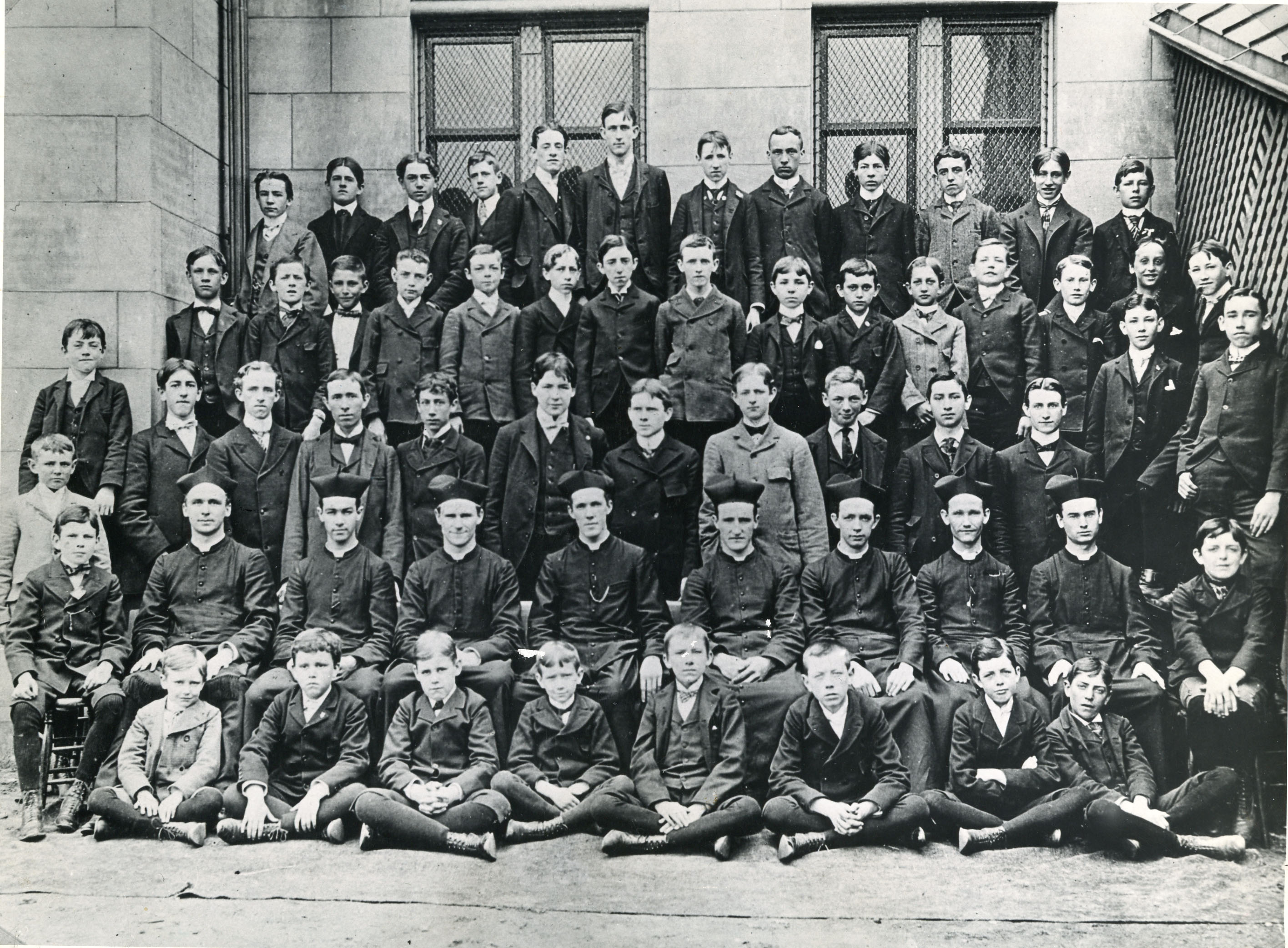 The first student body of St. Vincent’s College, 1899. (Image courtesy of Special Collections and Archives)Every year in June, the DePaul community celebrates commencement to recognize the noteworthy achievements and hard work of its graduating students. While graduation ceremonies are traditionally momentous occasions for those students and their families, this year the celebratory occasion is also marked by a significant moment in human history. It will undoubtedly be remembered as one of the more notable commencements in DePaul's history.
The first student body of St. Vincent’s College, 1899. (Image courtesy of Special Collections and Archives)Every year in June, the DePaul community celebrates commencement to recognize the noteworthy achievements and hard work of its graduating students. While graduation ceremonies are traditionally momentous occasions for those students and their families, this year the celebratory occasion is also marked by a significant moment in human history. It will undoubtedly be remembered as one of the more notable commencements in DePaul's history.
Even in its earliest days, DePaul honored the achievements of graduating students with a ceremony to confer degrees. DePaul's first commencement was held on June 19, 1899 in the College Building at Webster and Osgood, now Kenmore Avenue. It included only two degree recipients. Saint Vincent's College—eventually chartered as DePaul University—was founded in 1898 with a class of 70, comprised of both secondary and college-level students. Two members of that class, Mark Ignatius Sheridan and William David O'Brien, became the first graduates in university history to receive Bachelor of Arts degrees.
 President of Ireland, Sean T. O’Kelly, receives honorary degree from the Rev. Comerford J. O’Malley, C.M., in 1959. (Image courtesy of Special Collections and Archives)
President of Ireland, Sean T. O’Kelly, receives honorary degree from the Rev. Comerford J. O’Malley, C.M., in 1959. (Image courtesy of Special Collections and Archives)
Graduating classes and commencement ceremonies had grown exponentially by 1959, when hundreds of students and spectators filled the seats and lined the streets for a special Presidential convocation ceremony. That year, the College of Law presented an honorary doctorate of law to Sean T. O'Kelly, the president of Ireland. O'Kelly served as the second Irish president as a member of the left-wing Sinn Féin party and was known for his strong Catholic views. Previously, he had been arrested and imprisoned for fighting as part of the Irish rebellion attempting to declare independence from British rule in the Easter Rising of 1916.
In presenting the honorary degree, DePaul President Comerford J. O'Malley, C.M., compared O'Kelly's compassion for his fellow man to that of St. Vincent de Paul.
"Few men can boast of such long and sustained service to the cause of freedom," he declared.
The theater in the Frank J. Lewis Center was filled to capacity for the ceremony honoring the Irish president. A report in “The DePaulia" on the event noted O'Kelly was “visibly impressed by the award, and delayed the start of his acceptance speech to choke back tears." In that speech, O'Kelly expressed his sincere gratitude for the honor and pointed to the long-standing connection between the Irish and the Vincentian order.
A decade later, the air of celebration and accomplishment typical during the days leading up to graduation was overtaken by tragedy following the Kent State shootings on May 4, 1970. Protests exploded at universities across the nation in response to the incident. Students at DePaul were among those demonstrating in the name of peace, joining together for anti-war protests on both the Lincoln Park and Loop Campuses. Prior to commencement that year, a student group identifying themselves as "Graduates for Peace" circulated flyers across campus buildings asking their graduating classmates to wear white armbands instead of the traditional graduation cap, as part of a peace demonstration in support of the anti-war movement.
During the 1970 commencement exercises, the Graduates for Peace group interrupted the ceremony and attempted to take over the stage, with speeches and a special peace prize for a faculty member in hand. Then-president John R. Cortelyou, C.M., allowed a student representative from the group to speak for five minutes, but after the confusion and the cries of both support and boos from the audience, the microphones were unplugged and security guards cleared the students from the stage.
This year the COVID-19 pandemic demands an online comme ncement ceremony that prioritizes the health and safety of the DePaul community. But whether in-person or online, and with or without presidential visits, anti-war protests, or global pandemics, commencement is an experience to remember and celebrate for DePaul graduates who have worked diligently to earn their degrees.
Congratulations to the class of 2020 — yours is a notable achievement that will go down in history.